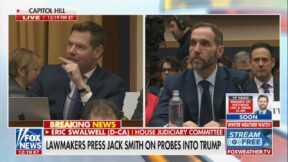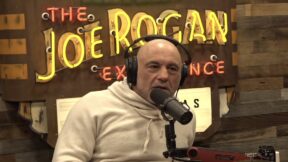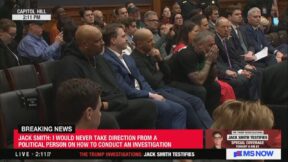Could Texas Really Turn Blue? The Lincoln Project Thinks So, And They’re Spending At Least $1 Million to Take That Bet

JIM WATSON/AFP via Getty Images
Could Texas turn blue?
It’s the question that many, many people have raised — often as a joke — for years. But the combination of changing demographics, chaos among the state Republican ranks, and the ongoing struggles of President Donald Trump’s campaign have led some to re-examine this question. Among them are the Republicans behind the anti-Trump PAC The Lincoln Project, betting that this is the year — and they’re putting a $1 million chip on the table to start.
Tuesday, the Lincoln Project announced that they were launching a $1 million ad buy in the Lone Star State, chiefly targeting hundreds of thousands of suburban and rural Republican women and Hispanics, voters whom they believe can be persuaded to vote against Trump.
The current buy is digital only, geotargeted in areas around the state ranging from rural counties like Lubbock, urban neighborhoods in Austin, and the Dallas-Fort Worth suburbs.
“We can more easily and effectively target the specific group of individuals we are trying to target digitally than we can with TV,” Ryan Wiggins, the PAC’s senior adviser for communications, told Mediaite. Wiggins added that they were considering expanding to television and mail in the final weeks before the election, and this $1 million investment was just an initial buy, planned to cover a week’s worth of digital ad placements.
The ads will include some of the PAC’s previous videos, like the viral “Mourning in America,” as well as new Texas-specific content, including some that will be in Spanish.
Wiggins and others associated with the Lincoln Project were optimistic that not only would they be dropping more cash into Texas, but that they had a real chance to move the needle.
Trump won the state by 9 points over Hillary Clinton in 2016, but the months of unemployment and the coronavirus pandemic have eroded what was viewed as an easy victory for him.
Publicly available polling has shown Joe Biden trailing Trump by only single digits since the beginning of the year, with the occasional poll showing the two in a statistical dead heat or Biden even up by a point or so.
“Yes, Texas is in play…the numbers are there,” said Lincoln Project co-founder Rick Wilson during the PAC’s “LPTV” live video broadcast Monday evening.
“Frankly, our numbers, legitimately, are freaking us the hell out,” said Wilson regarding their internal polling numbers in an exclusive interview with Mediaite.
According to Wilson, the data they had gathered provided them not just with the confidence to go on the offense in Texas, but also provided a road map for how to plan their attack.
Wilson specifically highlighted “record, off-the-charts intensity” with Black voters, and “women dropping off in droves” from Trump. He confirmed that the $1 million initial digital buy was “our opening bid,” and they are likely to spend more.
A lengthy profile of the PAC in the New Yorker Monday dove into this strategy of targeting Republicans to vote for Biden. The core group behind the Lincoln Project includes political consultants who advised Republican candidates and party organizations for decades, running state and national campaigns, conducting research, and creating ads.
The Lincoln Project is essentially leaving the task of turning out Democratic votes to the Biden campaign and the DNC, and focusing on reaching out to Republican voters in the language they understand, honed by their years crafting ads for GOP candidates.
Mike Madrid, another Lincoln Project co-founder, said that they had “identified 642,000 Republicans in Texas that are most likely abandon Trump and Republicans supporting him” to target with their ads.
“There is no serious political consultant who doesn’t agree that Texas is now a swing state,” Madrid continued, “and the Lincoln Project will be leading the charge to move Texas away from Trumpism.”
Texas has long been the Democrats’ Sisyphean nightmare: every time they thought they’d made progress, they found themselves tumbling down to the bottom of the hill to start all over again. The state has not voted for a Democratic presidential candidate since Jimmy Carter in 1976, and the last time a Democratic governor was elected was Ann Richards in 1990. All statewide offices have been held by Republicans since 1994, and they control both the State House and Senate.
Then-State Senator Wendy Davis went viral in 2013 for her pink-sneakered attempt to filibuster an anti-abortion bill but couldn’t translate that into a message that won over voters when she ran for governor in 2014, getting crushed by Greg Abbott 59 percent to 38 percent. Abbott notably won the women’s vote, Hispanic voters in the Rio Grande Valley, and even Davis’ own state senate district.
“In the only reliably Republican mega-state in the nation, the real competition now takes place in the spring primaries, where the chief worry for GOP incumbents is losing to a more conservative candidate,” wrote Texas Tribune’s Jay Root on the evening of Abbott’s “landslide” 2014 victory over Davis.
The closest any Democrat has come to electoral victory in a major race in Texas was Beto O’Rourke’s 2018 effort to take Sen. Ted Cruz’s seat. Cruz ultimately won, but it was closer than most had predicted, with him receiving only 50.9 percent of the vote over his Democratic challenger’s 48.3 percent. O’Rourke also set a new record for the most votes ever cast for a Democrat in Texas history (over 4 million, exceeding the 3.9 million Clinton had received in the 2016 presidential race), and has been credited with a down-ticket boost for other Democrats on the ballot that year.
“We have all the natural hesitations that people who have watched Texas for thirty years would,” acknowledged Wilson, “but Donald Trump has knocked out the support for Republican parties across the country, and Texas is no exception.”
Wilson pointed out recent news reports about the Trump campaign struggling for cash, having blown through a billion dollars and their television ads going dark in key states like Iowa and Ohio. “They’re pretty much just in Florida and North Carolina now,” said Wilson.
Meanwhile, the Biden campaign has reserved $5.8 million for an “advertising blitz” in the final weeks of the campaign, the Dallas Morning News reported on Monday, plus additional ads for Spanish language radio programs.
“That tells you a little something, huh?” Wilson quipped about Biden spending money in Texas.
“Trump has infected the Texas GOP, which used to be one of the strongest and most effective state parties in the country,” Wilson added, “but it has clearly surrendered to Trumpism and is being led by conspiracy theorists and washed up ex-candidates.”
For our readers who haven’t been following the ongoing circus that is the Texas political scene in 2020, back in June, multiple county Republican party leaders across the state found themselves going viral for all the wrong reasons, sharing racist memes, debunked conspiracy theories regarding George Floyd’s death, and other offensive content.
The situation got so controversial that then-Texas GOP chairman James Dickey, Gov. Abbott, Sen. Cruz, Sen. John Cornyn, and several other state Republican elected officials publicly rebuked the county leaders, including asking for a few of them to resign.
But instead of pushing for resignations and an intellectual purging of the conspiracy-mongers, the state party dove in deeper, tossing out Dickey and electing Allen West, who served one term in Congress representing a South Florida district before moving to Texas (undoubtedly the “washed up ex-candidate” to which Wilson was referring).
West, a firebrand who won as a tea party candidate but couldn’t survive electorally when redistricting made his district more moderate, has not tempered his message in the years since. The Texas GOP might do fine firing up their base but has shown far less interest lately in reaching out to persuade moderates and independents. The “Trump Boat Parade” in Austin last month that ended with multiple boats making distress calls and several even sinking to the bottom of Lake Travis may prove to be an apt metaphor for their tactical approach to this election.
The statewide elected Republicans are facing their own challenges and obstacles that hinder their ability to assist in winning voters over to their side, or even having the time to get involved at all in turning out the vote for Trump.
Besides battling with local party chairs, Abbott has faced vocal criticism and even protests over his management of the pandemic, mostly from the conservative wing of his party.
Lt. Gov. Dan Patrick has made comments during the pandemic like suggesting that older people like himself should be willing to sacrifice themselves for the economy, and harsh criticism for Dr. Anthony Fauci — again, language that fires up the base but is toxic for outreach efforts.
Cornyn is facing his most credible challenger in years from MJ Hegar. He’s favored to win but his time, attention, and money are going to be focused on his own race. Cornyn may be noticing some downward drag from Trump in his race; he told the Houston Chronicle on Monday that Trump had sowed “confusion” about the severity of Covid-19, among other criticisms.
Cruz’s biggest blessing this year is that he’s not on the ballot, having narrowly escaped O’Rourke two years ago. His rhetoric from that race and since has only served to paint him as a staunch conservative — and anathema to anyone who wasn’t attending tea party rallies a few years ago.
Attorney General Ken Paxton, already under indictment for an alleged securities fraud issue back when he was a legislator, got smacked with a letter from seven of his top aides accusing him of bribery and corruption. Texas Congressman Chip Roy, who served as Paxton’s first assistant attorney general, has publicly called for him to resign.
Speaker of the House Dennis Bonnen announced he would not run for re-election after he was caught on a recording offering to make political deals with a conservative activist group, deals that contradicted his own public statements.
Agriculture Commissioner Sid Miller is…well, let’s just say Miller is a character that has generated more than his share of outlandish headlines over the years. Google “sid miller jesus shot” for a sampling. Again, another Texas politician unhelpful for expanding the base of voters.
The bottom line is Trump has few allies on the ground in Texas who are able to provide effective get-out-the-vote help.
Whether the Lone Star State’s internal GOP chaos, plus Trump’s troubled handling of the pandemic will be enough to toss Texas’ 38 electoral college votes to Biden remains to be seen, but the Lincoln Project’s investment into the state aims to help make it happen.
Editor’s Note: the author is a former political colleague and long-time friend of Rick Wilson.
New: The Mediaite One-Sheet Newsletter
Your daily summary and analysis of what the many, many media newsletters are saying and reporting. Subscribe now!






Comments
↓ Scroll down for comments ↓